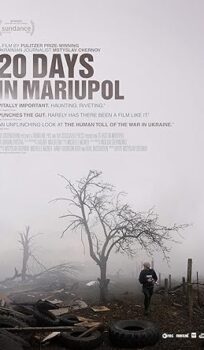
20 Days in Mariupol
- Mstyslav Chernov, Evgeniy Maloletka, Liudmyla Amelkina
- Mstyslav Chernov
- Documentary, War
- November 21, 2023
- 2023
Synopsis
Oscar Winner – Best Documentary Feature
Mstyslav Chernov is a journalist/photographer/videographer from Kharkhiv, in the Northeastern part of Ukraine. He has covered many well-known incidents, like the Donbas War, the Malaysian Airlines Flight 17 accident, the Syrian Civil War, etc.
In February 2022, the Russian Forces, as part of the Ukrainian invasion in place, decided to take the strategically important port city of Mariupol, part of the Russian-dominated Donestk Oblast, in the Southeastern coast of the Black Sea, and just a few kilometres away from the Russian border. Chernov and a team of Frontline PBS and Associated Press were there when the conflict started and, despite an increasingly dangerous and dire situation, with the risk of shelling and bombardment looming nearby, he decides to stay and document as much as possible, with the hopes of making the atrocities committed by the Russian Army known by the rest of the world.
Interspersed with the disturbing images of death and devastation depicted throughout the movie, we hear Chernov in voice-over, reflecting over the gradual descent to hell the city verifies, day by day, with heavy artillery mercilessly striking buildings, houses, schools, hospitals and businesses, as well as his own despair over the conflagration in his country and how he misses his wife and daughters and hopes they get to know this story, just like everyone else. The documentary appears divided in chapters representing each individual day Chernov and his journalistic team was in Mariupol, with each day showing how Russian fire increasingly destroys structures and murders men, women and children, while basic services slowly become scarce until, eventually, they are unavailable, and people, moved by desperation, also start looting stores for food and goods. Emergency services are overwhelmed, law enforcement has to assist the Ukrainian military fight the Russian invaders -to very little success, since, despite their fierce efforts, the Russians effectively circle in on them-. Hospitals go from being overrun by the wounded and killed to becoming morgues and shelters when other nearby buildings have been so ravaged that they become unsafe to be in. We also see mass graves crudely created to drop into them the mounting numbers of corpses that surpass the capacity to bury them properly.
Particularly worthy of mention is a brave, no-nonsense police chief named “Vladymir”, seen recurrently throughout the movie, guiding and helping Chernov, his team and the valiant -but very worn down- Ukrainian soldiers resisting the Russian attacks. Moreover, we see clips of news broadcastings showing clips of the ongoing destruction, not only in Mariupol, but in many other areas of Ukraine subject to the constant Russian attacks -the ones from Mariupol were made possible, thanks to Chernov risking his life, being driven, every day, to a location in the city, the only one with a functioning internet signal for the majority of the 20 days until the transmission towers were eventually downed, so he could transmit, via a satellite phone, all the gathered footage to his corresponding team elsewhere-, as well as images of Russian diplomats and members of the Putin Administration dismissing the footage as “staged”, “fake” and “the work of actors”.
By day 20, when the Russians have all but cut Mariupol from the outside world by zeroing on all the surrounding area and shutting down any possible escape routes, there is virtually no food, no water and no running electricity, and people are just seen aimlessly wandering on foot from one end of the city to the next, not knowing where to go or what to do, Chernov, following Vladymir’s advice, decides to leave -anguished survivors he has meet along the way encourage him to do so, begging him to tell this story to the rest of the world-. Vladymir, along with his own family, using the only escape corridor bargained between the Red Cross and the Russian Army, drives Chernov and the team out of Mariupol to safety while smuggling all his material within the car. The film ends with Chernov expressing, in voice-over, his sense of guilt and sorrow for leaving his fellow Ukrainians behind the way he did, but he is moved by the hope of surviving to see his family again and recounting to the rest of the world the story of what he saw and lived through.
Before the credits roll, title cards inform that it took 86 days to the Russian Army to completely take control of Mariupol and force the surrendering of the few, poorly equipped Ukrainian soldiers left, with an estimated death toll of 30,000 (believed more) civilians and soldiers dead and thousands of others homeless and turned fled refugees; we also see further images of the city being pummelled by heavy artillery fire and news parts of Russian diplomats being confronted about their Government’s actions and staunchly denying the legitimacy of it all.
